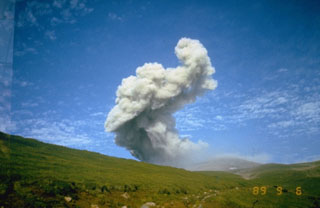Report on Ebeko (Russia) — 12 April-18 April 2023
Smithsonian Institution / US Geological Survey
Weekly Volcanic Activity Report, 12 April-18 April 2023
Managing Editor: Sally Sennert.
Please cite this report as:
Global Volcanism Program, 2023. Report on Ebeko (Russia) (Sennert, S, ed.). Weekly Volcanic Activity Report, 12 April-18 April 2023. Smithsonian Institution and US Geological Survey.
Ebeko
Russia
50.686°N, 156.014°E; summit elev. 1103 m
All times are local (unless otherwise noted)
According to the Tokyo VAAC a possible ash plume at Ebeko was visible in a satellite image at 0920 on 14 April rising to 2.4 (8,000 ft) a.s.l. and drifted NE. The plume had dissipated by 1120. Another plume from a possible eruption was identified in satellite images at 1300, rising to 3.7 (12,000 ft) a.s.l. and drifting N. The plume was no longer visible or had dissipated by 1720. At 1452 on 16 April an ash plume rose to 3 km (10,000 ft) a.s.l. and drifted NE.
Geological Summary. The flat-topped summit of the central cone of Ebeko volcano, one of the most active in the Kuril Islands, occupies the northern end of Paramushir Island. Three summit craters located along a SSW-NNE line form Ebeko volcano proper, at the northern end of a complex of five volcanic cones. Blocky lava flows extend west from Ebeko and SE from the neighboring Nezametnyi cone. The eastern part of the southern crater contains strong solfataras and a large boiling spring. The central crater is filled by a lake about 20 m deep whose shores are lined with steaming solfataras; the northern crater lies across a narrow, low barrier from the central crater and contains a small, cold crescentic lake. Historical activity, recorded since the late-18th century, has been restricted to small-to-moderate explosive eruptions from the summit craters. Intense fumarolic activity occurs in the summit craters, on the outer flanks of the cone, and in lateral explosion craters.

